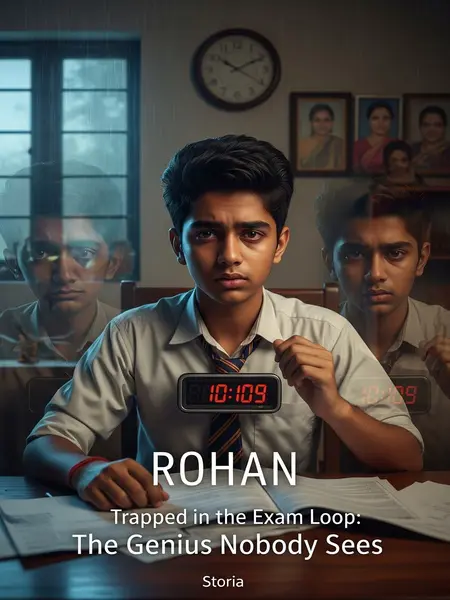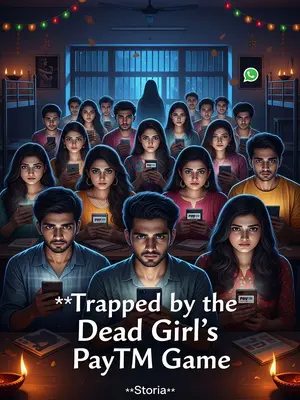Chapter 5: Rituals, Romance, and Fatigue
[The time loop is usually triggered during stage tests, such as monthly exams.]
[The only way to escape the time loop is to fully master all the chapters covered in the monthly test.]
[You must truly master the knowledge; shortcuts or tricks cannot deceive the loop.]
I wrote these three sentences solemnly at the front of my notebook. The notebook cover was a little worn at the edges, corners curling like the pages of my father’s old Ramayana.
Even though I knew them by heart, writing them down had become a ritual for me. Rituals are a kind of support—in this endless cage of loops, I needed them to keep myself sane. Like my mother’s morning prayer, or the way my grandmother would tie a black thread on my wrist to ward off evil.
Without these rituals, I might have gone mad long ago. It was my only way of fighting back, a small anchor in the endless tide of repetition.
There were 98 days left until the board exams.
The material was getting harder and harder. In class 9, maybe after one or two loops I could completely master the content of a stage test. But in class 12, things were different. The textbooks grew heavier, the diagrams more complex. Even the seniors who had breezed through earlier years struggled now.
My weaknesses became more and more apparent—especially in maths and physics. Many concepts I simply couldn’t grasp, needing repeated loops to fully digest them. The formulas danced in front of my eyes, mocking me. My father, who used to help with sums, could only shake his head—'Beta, ab toh mujhe bhi yaad nahi hai.'
This monthly test, I’ve already looped for 443 days.
After 443 loops, I know everything about these seven days like the back of my hand. For example, in two seconds, a koel will call from the gulmohar tree outside, drawing the teacher’s attention. Then, a paper ball will fly towards me, containing a 125-word love letter. If I accept it, I know it will start the class prefect romance storyline—lasting three days, with 892 lines of conversation and five WhatsApp DPs.
I’ve already experienced these plots countless times, so—
I thought:
A koel called outside with a soft note. The teacher turned her head instinctively. At the same time, a paper ball flew towards me. Without any extra movement, I simply turned my head for the 411th time, expressionlessly watching the paper ball brush past my cheek and land beside the dustbin.
The paper ball was wrapped in a page torn from her rough notebook—the corner still had a doodle of a heart pierced by an arrow. The class prefect next to me silently lowered her head, a trace of disappointment flickering in her eyes. But I had no energy to care about her feelings. Her friends glanced at me, then giggled behind their palms, whispering in Hindi. The words hung in the air, as fragile as the chalk dust drifting across the sunlight.
I continued working on the big calculus problem, fully focused. I’d tried this kind of problem countless times, but still needed to consult the solution over a dozen times before I could truly understand it. My rough book was filled with crossed-out attempts, smudged with blue ink.
Everyone always thought I was a genius. Ever since class 9, I’d displayed extraordinary talent—always ranking first in the batch, mature far beyond my years. Teachers would call me 'beta' in the staff room and ask me to explain doubts to others. Parents of juniors would point at me during PTMs: 'Dekho, Rohan ko dekho.'
In the board exams, I was the state topper with 749 marks, more than 50 marks ahead of the runner-up. My photograph even appeared in the local newspaper, a garland of marigolds around my neck, my mother wiping a tear of pride.
But only I know:
I’m actually just an ordinary person of average ability. I struggle like everyone else. I crave pani puri after school, I laugh at silly memes, I sometimes feel like crying for no reason at all.
Without the time loop, I might not even have made it into the top 50 in my batch. Maybe not even that.
Every score, every seemingly genius performance, wasn’t the result of talent—it was bought with countless loops.
That cage that imprisoned me.
Sometimes, I sink into endless fatigue. The loop makes all effort feel meaningless, because you already know the ending. There’s no suspense, no fear, no joy—just the dull repetition of a song on loop, long after you’ve memorised every note.
I once tried giving up on studying, tried doing crazy things—skipping class to play games at the cyber café, openly provoking teachers, even making shocking predictions about the future in class. I’d tell the teacher what the surprise inspection would reveal, or announce the cricket match result before it happened. The class would erupt in laughter, some calling me 'baba', others just shaking their heads.
But the results of these attempts only made me feel more exhausted. The jokes grew stale, the games lost their thrill. Even the samosas at the cyber café tasted bland after a while.
A life without consequences is truly suffocating.
So I returned to the textbooks, continuing to tackle those difficult problems that gave me headaches. Because if I didn’t, the loop would never let me go. My mother’s gentle 'Padho beta, padho' became my mantra.
The loop didn’t make me a real genius; it made me an ordinary person tormented by knowledge. I have to repeat everything again and again, until every concept is burned into my mind. There was no shortcut, no easy way out.
"Everyone did well in this monthly test—let’s skip Rohan and go straight to second place..."
Familiar words echoed from the front. The teacher’s tone and expression hadn’t changed at all. The class let out a collective sigh, some with envy, others with relief that they weren’t the ones being singled out.
Hearing this, I let out a long sigh of relief. No time loop. Not today. For a moment, the world seemed to exhale with me.
At this moment, I felt a rare sense of ease. Every time a test ended without triggering the loop, I would especially cherish this brief period of time. Because on days without loops, the passage of time feels real and vivid. The world felt new again, even if only for a day.
I looked out the window. Sunlight filtered through the neem leaves, casting dappled patterns on the classroom floor. The wind gently stirred the curtains, like a soft hand caressing the room. Somewhere in the distance, the peon’s whistle signalled lunch break was near.
In these ordinary moments, I felt a deep sense of peace. Because everything that comes next is unknown—and the unknown means novelty. Even the smallest uncertainty became precious.
But deep down, I knew—nothing lasts forever. The loop was always waiting.
Humans are creatures driven by curiosity. If everything is predetermined, what’s the point of living? If you already know what’s coming, what remains to be discovered?








